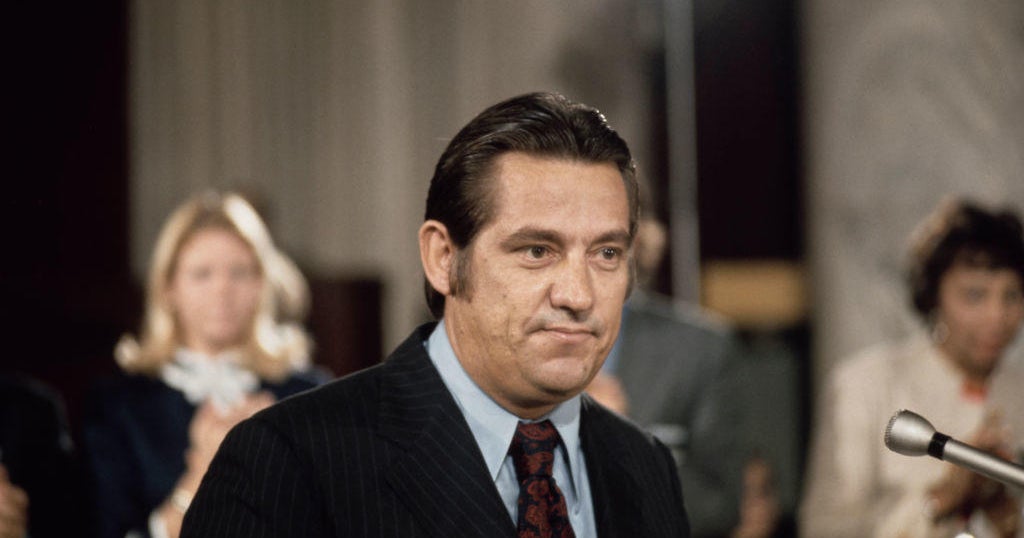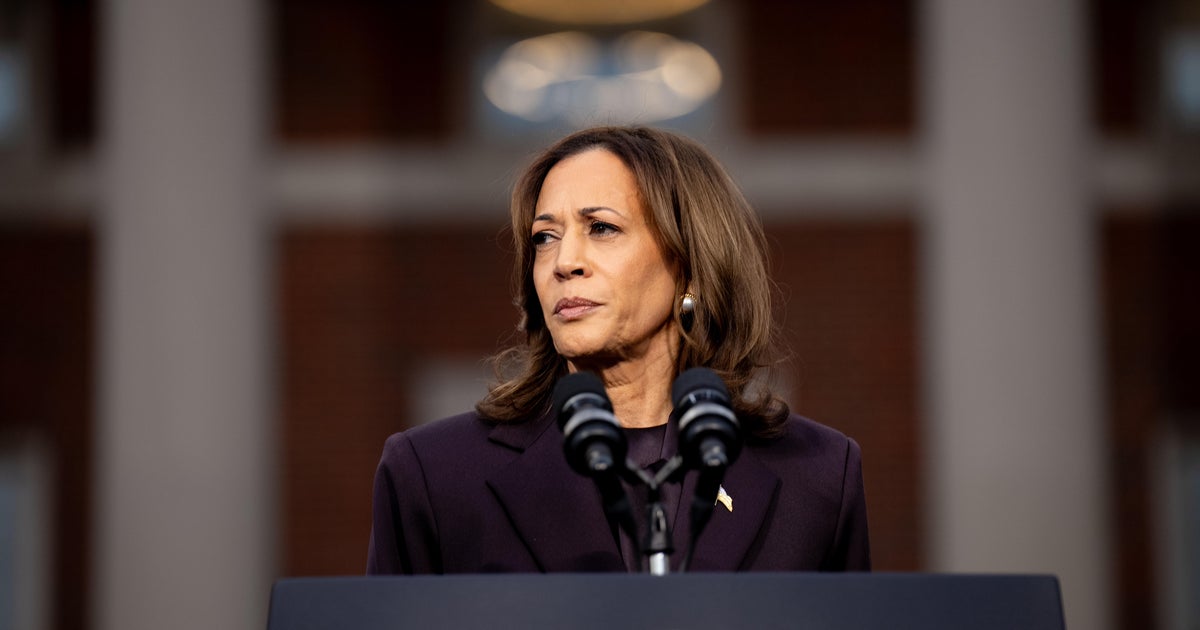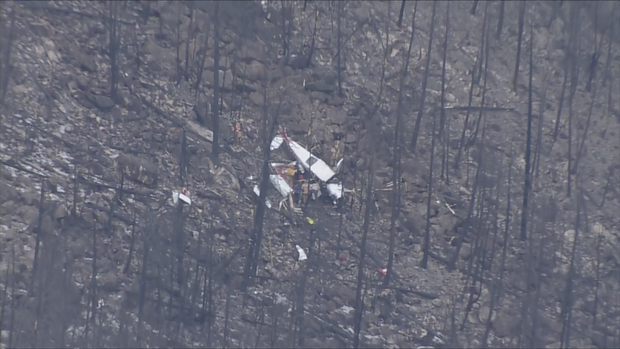CBS News
Harris reiterates support for “Dreamers,” as she courts Latino voters at town hall

Las Vegas — Vice President Kamala Harris fielded questions about immigration, the economy and healthcare at a town hall with Univision Thursday. Polls suggest these issues are critical to the Latino voting bloc, and many of these questions were posed by people who had very personal, emotional stories to tell.
Supports “Dreamers,” pins blame on Trump for bipartisan border bill
Jesus Aispuro, a first-time voter from California, told Harris he has friends who are “Dreamers,” undocumented immigrants brought into the country as children. Pressing her on what she’d do to protect Dreamers under the Deferred Action for Childhood Arrivals program, Harris said she’d prioritize an immigration plan that establishes a pathway to citizenship.
In response to a case in front of a federal appeals court over the fate of DACA, Harris’ campaign issued a statement during the town hall saying Harris “will always stand with Dreamers and keep families together” and urging Congress to pass “an earned pathway to citizenship for these young people.”
Yvette Castillo began her question by noting she and Harris have something in common: both of their mothers are dead. Castillo noted her mother died six weeks ago, and while she was alive, she did not succeed in acquiring U.S. citizenship. Harris’ mother died in 2009.
“What are your plans to support that subgroup of immigrants who have been here their whole lives and have to live and die in the shadows?” Castillo asked.
Harris repeatedly said she was sorry for Castillo’s loss, and then she said the bipartisan border bill that former President Donald Trump lobbied Republican lawmakers to vote against could have created “a comprehensive earned pathway to citizenship for hard working people.”
She went on to argue that this failure to enact legislation bore responsibility for the outcome Castillo’s mother had.
“Had your mother been able to gain citizenship, she would have been entitled to health care that may have alleviated her suffering and yours. And this is one example of the fact that there are real people who are suffering because of an inability to put solutions in front of politics,” Harris added.
The Latino vote is crucial for Harris’ path to the White House, and polling shows it’s a more competitive fight than in 2020. Harris holds an 18-point advantage over former president Donald Trump, according to a September CBS News poll. It’s a smaller gap compared to President Joe Biden’s 33-point advantage with Latino voters in a 2020 CBS News exit poll.
“The largest segment of undecided voters right now are still within the Latino community. So doing town halls like this, it’s going to places like Arizona… having folks like the rest of us all across those state, are going to be very important,” Rep. Robert Garcia of California said after the debate.
“Latinos are going to have an outsized influence in this election because the margins are so tight,” he added.
Criticizes Trump over reports he sent COVID tests to Putin, can’t list three virtues about him
Mario Sigbaum, a 70-year-old independent and undecided voter, questioned how Harris was able to become the Democratic nominee and said the late switch resulting from President Biden’s late exit from the race “inclined me to vote for Trump.”
After Harris praised Mr. Biden for supporting her run, she highlighted her own support from Republicans and argued Trump admires “dictators and autocracy.” She criticized Trump over reports he sent Russian President Vladimir Putin a COVID test machine during the COVID-19 pandemic.
“I’m sure people here have family members or friends who died [from COVID], and he secretly shipped off COVID tests to Vladimir Putin of Russia. When people died — hundreds were dying every day,” Harris said, adding that she and Mr. Biden tried to address the disproportionate rate of Latino and Black Americans dying from COVID infections.
“So, I present that to you, sir, to say, this is an extraordinary time,” she said.
Asked by a voter at the end if she could name three virtues of Trump, Harris noted his love for his family, but declined to add more.
“Family is one of the most important things that we can prioritize. But I don’t really know him to be honest with you. I’ve only met him one time on the debate stage. So, I don’t really have much more to offer you,” she said.
Hurricane Milton response
The town hall began with Ramiro Gonzalez, a voter from Tampa, Florida, who noted more than one hurricane had struck his home.
“Rumors are that your administration didn’t do enough to respond to the last hurricane. What would you specifically do, or your administration do, to help us in the Tampa Bay area or the Central Florida area with this hurricane?” he asked Harris.
Harris responded by decrying disinformation spread about the federal response to recent hurricanes. “I have to stress that this is not a time for people to play politics,” she said. She then listed her continual briefings and contact with state and local officials on the ground, and warned against companies that are raising prices in impacted areas.
Economy and health care: “Prices are too high, still… and we have to deal with it.”
Asked by Wendy Solares — a mother who houses her children, as well as her parents — what Harris would do to help the middle class, Harris took a more sympathetic tone to the rise in the cost of living.
“I know prices are too high, still. You know prices are too high, still. And we have to deal with it,” she said, before listing out her economic plan to lower costs through being more aggressive on price gouging by grocery companies and by issuing tax credits for parents and down payment assistance for first time home buyers.
Martha Rodriguez, a 62-year-old homeless woman whose medical conditions — a heart attack and “long COVID” — caused her to lose her job and income, asked Harris how she’d help disabled citizens get their insurance faster through Social Security.
Harris noted that she pushed to designate long COVID as a condition that should be covered by the Americans with Disabilities Act, and that as president, she would work to make sure medical debt does not affect credit scores.
“The point is being very simple, frankly, which is that all people, regardless of disability, should have equal access to housing, to job opportunities, to education, and again, community, and there’s still a lot of work that we have to do in that regard,” Harris responded.
CBS News
2 killed in U.S. Civil Air Patrol plane crash near Palisade Mountain in Northern Colorado

Two people were killed and a third was injured when a U.S. Civil Air Patrol plane crashed in Colorado’s Front Range Saturday morning.
The small passenger plane with three people aboard crashed near Storm Mountain and Palisade Mountain west of Loveland around 11:15 a.m., according to the Larimer County Sheriff’s Office. The plane belonged to the Civil Air Patrol, the civilian auxiliary wing of the U.S. Air Force, and was on a routine aerial photography training mission when it went down, officials said.
Pilot Susan Wolber and aerial photographer Jay Rhoten were identified by CAP as those killed and co-pilot Randall Settergren was identified as the person injured. Settergren was airlifted to an area hospital by a National Guard helicopter, where he is undergoing medical care.
CBS
“The volunteers of Civil Air Patrol are a valuable part of the Department of Military and Veterans Affairs, and the lifesaving work they do on a daily basis directly contributes to the public safety of Coloradans throughout the state,” Maj. Gen. Laura Clellan, adjutant general of the Colorado Department of Military and Veterans Affairs, said in a statement Saturday.
“We are devastated to hear of the loss of Susan Wolber and Jay Rhoten, and the injury of Randall Settergren, during a training mission in Larimer County. Our thoughts and deepest condolences are with the families of those involved in the crash,” Clellan continued. “I would also like to thank all of the first responders who assisted with rescue efforts.”
Palisade Mountain is in Larimer County, about 20 miles west of Loveland and about 65 miles northwest of Denver. The area is part of the burn scar of the Alexander Mountain Fire, which burned almost 10,000 acres in over two weeks this past summer.
The crash happened about 200 feet below the summit of Palisade Mountain in an area that includes tall trees and steep hills as part of the mountain range. Rescue crews were heard on radio traffic working to find a landing zone for rescue helicopters. No structures were impacted by the crash.
The plane crashed in “very rugged” and “extensive and rocky terrain,” Ali Adams, a Larimer County Sheriff’s Office spokeswoman, said at a news conference. First responders had to hike out to the site and the sole survivor was “severely injured” when responders finally got to them.
Rescue efforts were ongoing at 3:15 p.m., according to Adams, and recovery efforts for the two deceased people’s bodies could take several days.
Several agencies responded, including the Loveland Fire Rescue Authority, Thompson Valley EMS and the National Guard.
The Larimer County Sheriff’s Office is the lead agency investigating the crash and the Federal Aviation Administration and National Transportation Safety Board will assist, according to Adams. The NTSB said it too was investigating the crash and identified the plane as a Cessna 182.
“This is one of those incidents that is really low frequency; it doesn’t happen really often, but unfortunately, our first responders have had more than their fair share of responses,” Adams said.
George Solheim lives in the area of the crash. He described conditions as “extremely windy” on Saturday and heard the plane just prior to the crash. He says he could hear “loud ‘throttle up/down’ immediately prior to sudden silence at (the) time of (the) crash. Couldn’t hear sounds of impact from here.”
Colorado Gov. Jared Polis extended his sympathy to the families of the victims in a statement Saturday evening:
“I’m saddened to hear of the loss of two dedicated Civil Air Patrol members, Pilot Susan Wolber and aerial photographer Jay Rhoten, who lost their lives in today’s crash and my thoughts are with their families, friends and colleagues. These individuals, along with survivor co-pilot Randall Settergren, who was injured, served the Civil Air Patrol as volunteers who wanted to help make Colorado a better, safer place for all. The State of Colorado is grateful for their commitment to service and it will not be forgotten. I also want to thank the first responders who assisted with the rescue and recovery efforts.”
CBS News
Fred Harris, former Democratic U.S. senator and presidential candidate, dies at 94

Fred Harris, a former U.S. senator from Oklahoma, presidential hopeful and populist who championed Democratic Party reforms in the turbulent 1960s, died Saturday. He was 94.
Harris’ wife, Margaret Elliston, confirmed his death to The Associated Press. He had lived in New Mexico since 1976.
“Fred Harris passed peacefully early this morning of natural causes. He was 94. He was a wonderful and beloved man. His memory is a blessing,” Elliston said in a text message.
Bettmann Archive/Getty Images
Harris served eight years in the Senate, first winning in 1964 to fill a vacancy, and made unsuccessful bid for the presidency in 1976.
“I am deeply saddened to learn of the passing of my longtime friend Fred Harris today,” Democratic New Mexico Gov. Michelle Lujan Grisham wrote in a post to social media. “Harris was a towering presence in politics and in academia, and his work over many decades improved New Mexico and the nation. He will be greatly missed.”
Democratic Sen. Martin Heinrich of New Mexico said in a statement that “New Mexico and our nation have lost a giant,” describing him as a “tireless champion of civil rights, tribal sovereignty and working families.”
It fell to Harris, as chairman of the Democratic National Committee in 1969 and 1970, to help heal the party’s wounds from the tumultuous national convention in 1968 when protesters and police clashed in Chicago.
He ushered in rule changes that led to more women and minorities as convention delegates and in leadership positions.
“I think it’s worked wonderfully,” Harris recalled in 2004, when he was a delegate to the Democratic National Convention in Boston. “It’s made the selection much more legitimate and democratic.”
“The Democratic Party was not democratic, and many of the delegations were pretty much boss-controlled or -dominated. And in the South, there was terrible discrimination against African Americans,” he said.
Harris ran unsuccessfully for the Democratic presidential nomination in 1976, quitting after poor showings in early contests, including a fourth-place win in New Hampshire. The more moderate Jimmy Carter went on to win the presidency.
Harris moved to New Mexico that year and became a political science professor at the University of New Mexico. He wrote and edited more than a dozen books, mostly on politics and Congress. In 1999 he broadened his writings with a mystery set in Depression-era Oklahoma.
Throughout his political career, Harris was a leading liberal voice for civil rights and anti-poverty programs to help minorities and the disadvantaged. Along with his first wife, LaDonna, a Comanche, he also was active in Native American issues.
“I’ve always called myself a populist or progressive,” Harris said in a 1998 interview. “I’m against concentrated power. I don’t like the power of money in politics. I think we ought to have programs for the middle class and working class.”
“Today ‘populism’ is often a dirty word because of how certain leaders wield power,” Heinrich said in his statement Saturday. “But Fred represented a different brand of populism — one that was never mean or exclusionary. Instead, Fred focused his work and attention on regular people who are often overlooked by the political class.”
Harris was a member of the National Advisory Commission on Civil Disorders, the so-called Kerner Commission, appointed by then-President Lyndon Johnson to investigate the urban riots of the late 1960s.
The commission’s groundbreaking report in 1968 declared, “our nation is moving toward two societies, one black, one white — separate and unequal.”
Thirty years later, Harris co-wrote a report that concluded the commission’s “prophecy has come to pass.”
“The rich are getting richer, the poor are getting poorer and minorities are suffering disproportionately,” said the report by Harris and Lynn A. Curtis, president of the Milton S. Eisenhower Foundation, which continued the work of the commission.
Norman Ornstein of the American Enterprise Institute said Harris rose to prominence in Congress as a “fiery populist.”
“That resonates with people…the notion of the average person against the elite,” Ornstein said. “Fred Harris had a real ability to articulate those concerns, particularly of the downtrodden.”
In 1968, Harris served as co-chairman of the presidential campaign of then-Vice President Hubert Humphrey. He and others pressed Humphrey to use the convention to break with Johnson on the Vietnam War. But Humphrey waited to do so until late in the campaign, and narrowly lost to Republican Richard Nixon.
“That was the worst year of my life, ’68. We had Dr. Martin Luther King killed. We had my Senate seatmate Robert Kennedy killed and then we had this terrible convention,” Harris said in 1996.
“I left the convention — because of the terrible disorders and the way they had been handled and the failure to adopt a new peace platform — really downhearted.”
After assuming the Democratic Party leadership post, Harris appointed commissions that recommended reforms in the procedures for selecting delegates and presidential nominees. While lauding the greater openness and diversity, he said there had been a side effect: “It’s much to the good. But the one result of it is that conventions today are ratifying conventions. So it’s hard to make them interesting.”
“My own thought is they ought to be shortened to a couple of days. But they are still worth having, I think, as a way to adopt a platform, as a kind of pep rally, as a way to get people together in a kind of coalition-building,” he said.
Harris was born Nov. 13, 1930, in a two-room farmhouse near Walters, in southwestern Oklahoma, about 15 miles from the Texas line. The home had no electricity, indoor toilet or running water.
At age 5 he was working on the farm and received 10 cents a day to drive a horse in circles to supply power for a hay bailer.
He worked part-time as a janitor and printer’s assistant to help for his education at University of Oklahoma. He earned a bachelor’s degree in 1952, majoring in political science and history. He received a law degree from the University of Oklahoma in 1954, and then moved to Lawton to practice.
In 1956, he won election to the Oklahoma state Senate and served for eight years. In 1964, he launched his career in national politics in the race to replace Sen. Robert S. Kerr, who died in January 1963.
Harris won the Democratic nomination in a runoff election against J. Howard Edmondson, who left the governorship to fill Kerr’s vacancy until the next election. In the general election, Harris defeated an Oklahoma sports legend — Charles “Bud” Wilkinson, who had coached OU football for 17 years.
Harris won a six-year term in 1966 but left the Senate in 1972 when there were doubts that he, as a left-leaning Democrat, could win reelection.
Harris married his high school sweetheart, LaDonna Vita Crawford, in 1949, and had three children, Kathryn, Byron and Laura. After the couple divorced, Harris married Margaret Elliston in 1983. A complete list of survivors was not immediately available Saturday.
CBS News
Compromise deal reached at COP29 climate talks for $300 billion a year to poor nations

Countries agreed on a deal to inject at least $300 billion annually in humanity’s fight against climate change, aimed at helping poor nations cope with the ravages of global warming at tense United Nations climate talks in the city where industry first tapped oil.
The $300 billion will go to developing countries who need the cash to wean themselves off the coal, oil and gas that causes the globe to overheat, adapt to future warming and pay for the damage caused by climate change’s extreme weather. It’s not near the full amount of $1.3 trillion that developing countries were asking for, but it’s three times the $100 billion a year deal from 2009 that is expiring. Delegations said this deal is headed in the right direction, with hopes that more money flows in the future.
“Everybody is committed to having an agreement,” Fiji delegation chief Biman Prasad said as the deal was being finalized. “They are not necessarily happy about everything, but the bottom line is everybody wants a good agreement.”
It’s also a critical step toward helping countries on the receiving end create more ambitious targets to limit or cut emissions of heat-trapping gases that are due early next year. It’s part of the plan to keep cutting pollution with new targets every five years, which the world agreed to at the U.N. talks in Paris in 2015.
The Paris agreement set the system of regular ratcheting up climate fighting ambition as away to keep warming under 1.5 degrees Celsius above pre-industrial levels. The world is already at 1.3 degrees Celsius and carbon emissions keep rising.
Countries also anticipate that this deal will send signals that help drive funding from other sources, like multilateral development banks and private sources. That was always part of the discussion at these talks — rich countries didn’t think it was realistic to only rely on public funding sources — but poor countries worried that if the money came in loans instead of grants, it would send them sliding further backward into debt that they already struggle with.
“The $300 billion goal is not enough, but is an important down payment toward a safer, more equitable future,” said World Resources Institute President Ani Dasgupta. “This deal gets us off the starting block. Now the race is on to raise much more climate finance from a range of public and private sources, putting the whole financial system to work behind developing countries’ transitions.”
It’s more than the $250 billion that was on the table in the first draft of the text, which outraged many countries and led to a period of frustration and stalling over the final hours of the summit. After an initial proposal of $250 billion a year was soundly rejected, the Azerbaijan presidency brewed up a new rough draft of $300 billion, that was never formally presented, but also dismissed roundly by African nations and small island states, according to messages relayed from inside.
The several different texts adopted early Sunday morning included a vague but not specific reference to last year’s Global Stocktake approved in Dubai. Last year there was a battle about first-of-its-kind language on getting rid of the oil, coal and natural gas, but instead it called for a transition away from fossil fuels. The latest talks only referred to the Dubai deal, but did not explicitly repeat the call for a transition away from fossil fuels.
Countries also agreed on the adoption of Article 6, creating markets to trade carbon pollution rights, an idea that was set up as part of the 2015 Paris Agreement to help nations work together to reduce climate-causing pollution. Part of that was a system of carbon credits, allowing nations to put planet-warming gasses in the air if they offset emissions elsewhere. Supporters said a U.N.-backed market could generate up to an additional $250 billion a year in climate financial aid.
Despite its approval, carbon markets remain a contentious plan because many experts say the new rules adopted don’t prevent misuse, don’t work and give big polluters an excuse to continue spewing emissions.
“What they’ve done essentially is undermine the mandate to try to reach 1.5,” said Tamara Gilbertson, climate justice program coordinator with the Indigenous Environmental Network. Greenpeace’s An Lambrechts, called it a “climate scam” with many loopholes.
With this deal wrapped up as crews dismantle the temporary venue, many have eyes on next year’s climate talks in Belem, Brazil.









